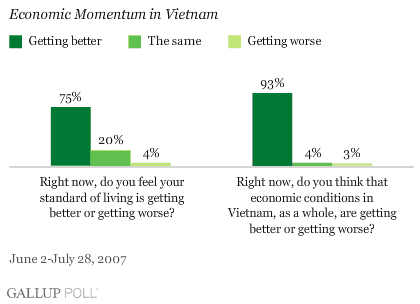WASHINGTON, D.C. -- The communist government of Vietnam does not appreciate groups that aim to disrupt the power structure in place since North and South Vietnam were reunified in July 1976. Most recently, six foreigners of Vietnamese ethnicity were arrested and detained in November while handing out fliers and promoting nonviolence as a means to bring about democracy. Within the context that arrests and imprisonment are common in Vietnam for these types of activities, ║┌┴¤═°'s finding that 15% of Vietnamese say they expressed their opinions to a public official within the last month seems noteworthy.
At the moment, the pro-democracy movement in Vietnam can be described as "fledgling," and according to reports from Human Rights Watch consistently "under threat." Further, data from a 2007 ║┌┴¤═° Poll in Vietnam suggests the population as a whole may not share the ideals of this movement or be interested in upsetting the status quo. ║┌┴¤═° finds 91% of respondents express confidence in the national government.
The high level of confidence among the Vietnamese people may be at least partially bolstered by the positivity surrounding the economy: 75% of respondents feel that their personal standard of living is improving, and more than 9 in 10 (93%) say the national economy is getting better. Economic optimism and soaring confidence in the government may be what has kept recent attempts to organize a popular uprising from fully taking shape. If the economy continues to ascend, the people of Vietnam may continue to be willing to sacrifice certain freedoms for the foreseeable future.

Survey Methods
Results are based on face-to-face interviews with 1,018 adults in Vietnam, aged 15 and older, conducted June 2-July 28, 2007. For results based on the total sample of national adults, one can say with 95% confidence that the maximum margin of sampling error is ┬▒3 percentage points. In addition to sampling error, question wording and practical difficulties in conducting surveys can introduce error or bias into the findings of public opinion polls.
